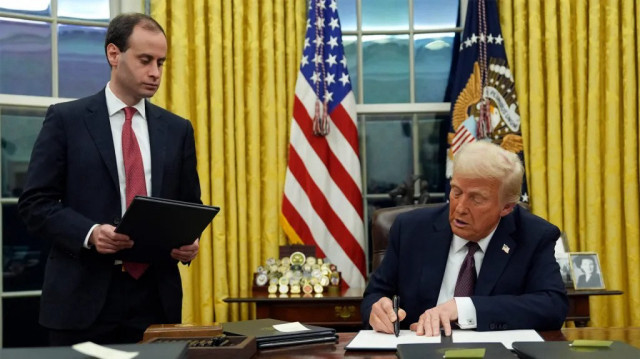
US president pulls out of OECD global tax treaty, dismissing it as having ‘no force or effect,' jeopardizing an initiative that could generate up to $32B in global tax revenue, particularly aiding low-income nations
US President Donald Trump has withdrawn from the OECD global corporate tax treaty via an executive order issued on Monday, declaring that the agreement has “no force or effect” in the United States. The move threatens global tax cooperation and could derail a historic effort to reform international tax rules.
The treaty, announced in October 2021, was signed by 140 countries representing over 90% of global GDP, including major economies such as China, the UK, Germany, France, Japan, and Türkiye. It aimed to impose a minimum 15% tax rate on multinational corporations with global revenues exceeding €750 million ($780.5 million), such as Google, Amazon, Microsoft, and Meta (Facebook), starting in 2024.
The OECD estimated that the agreement would generate between $17 billion and $32 billion in additional global tax revenue, with the largest benefits expected for low- and middle-income countries.
The treaty was designed to curtail tax avoidance by multinational companies that establish operations in low-tax jurisdictions like Ireland and Hungary. Although it was initially set to take effect in 2023, delays in global adoption slowed its implementation.
Trump's executive order said: “The OECD Global Tax Deal supported under the prior administration not only allows extraterritorial jurisdiction over American income but also limits our Nation's ability to enact tax policies that serve the interests of American businesses and workers.”
- Global tax cooperation in jeopardy
Analysts warn that Trump's withdrawal signals a major shift in global tax policy, particularly since many of the affected digital companies are headquartered in the US. This decision complicates efforts to address tax avoidance, a growing challenge in the digital economy.
At the G20 forum in Brazil last year, French economist Gabriel Zucman proposed a plan to set international standards for taxing billionaires, which could generate $200–$250 billion annually. However, Trump's stance has reduced the likelihood of such initiatives moving forward.
In another executive order, Trump directed the US Treasury to develop strategies to shield American firms from foreign tax laws perceived as burdensome.
During his first term, Trump introduced a 10% minimum tax on American corporations operating domestically, while the Biden administration later proposed a 15% global minimum tax in 2021.
Another key component of the OECD tax deal involves determining how taxation rights are shared among participating countries. In 2021, the US agreed to the treaty to prevent unilateral digital taxes by countries like France, Spain, and Italy. However, Congress failed to pass measures to align US firms with the treaty's requirements.
France, which imposed its own digital services tax in December 2020, withdrew the measure following the OECD agreement but could reinstate it amid US non-compliance.
Dan Ciuriak, an economist and principal at Ciuriak Consulting, told Anadolu that the digital economy poses unique challenges to tax governance. Companies like Google, Amazon, and Meta profit significantly from virtual operations, which are often untaxed under traditional corporate tax frameworks.
Ciuriak emphasized that this dynamic has reduced corporate tax revenues in OECD countries, as data-driven business models are not adequately accounted for in existing tax systems.
To address the issue, Ciuriak suggested three potential solutions: unilateral digital services taxes, internationally coordinated digital taxes, or exclusionary measures like national digital firewalls for non-compliant platforms. He added: “It's only a matter of time before decisive action is taken.”

